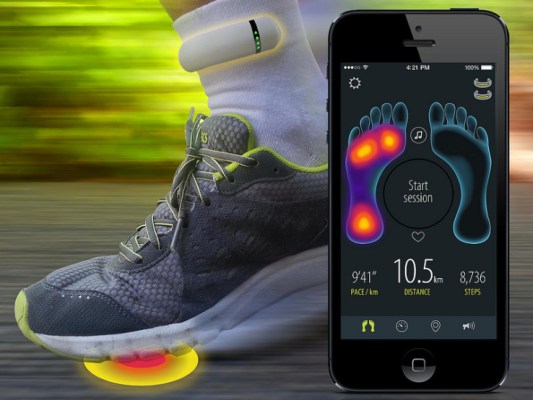I just returned from the most exciting Consumer Electronics Show I’ve ever covered. Thanks to extraordinary demand for gadgets that make us healthier, stronger, and smarter, the technology industry is putting some serious brain power behind the next generation of wearable health devices. Over the next year, a torrent of new devices is hitting the market to provide automated elite coaching, a pocket-sized clinical lab, and your own personal assistant.
Labs In Your Pocket
It seems that nearly every time I rush head-first into a new diet or exercise program, I find months later there’s some crucial oversight that’s holding back my progress or actively destroying my body. Exasperated in frustration, I drag myself to a clinic for expert diagnostics, only to discover simple advice I should have been following from the beginning.
Now, nearly every expensive lab test I’ve gotten over the past year is coming to the delightful convenience of my smartphone. The Sensoria smart sock correctly diagnosed that I make the runner’s rookie mistake of heel striking, leading to a workout-stopping knee pain (available this spring).
Valencell’s PerformTech in-ear heart-rate monitor calibrated my V02Max (a common measure of endurance) in a nearly painless five minutes of light stair-stepper work on the CES show floor (available now). The results were within 5 percent of lab-test results I received months earlier and helped me know that two months of running San Francisco’s hills are probably paying off.
Quality rest is just as important as hitting the gym. The Basis B1 wristwatch, Sleeprate app, and Withing’s Aura bed pad will diagnose the quality of the major stages of sleep, including crucial REM cycles.* I got a preview of Sleeprate’s heart-rate-monitor-powered app, and apparently I’ve got a nasty restless sleep cycle (Basis update coming January 21, Sleeprate January 23rd, and Aura in the spring).
Unlike a lab test, these devices can follow you wherever you go, ensuring you actually follow through with the advice. Many of us work so hard at self-improvement; it’s nice to know that our time isn’t going to waste.
Automated Elite Coaching
The defining feature of the world’s sharpest coaching minds is a broad novel strategy that is meticulously applied to each student. The delicious replicability of elite coaching makes it ripe for automation.
While last year was all about fitness gadgets that monitor activity, “what’s going to happen next is teaching technique,” said Ruth Thomason of Cambridge Consultants. Cambridge was showing off the ArcAid basketball free-throw technique video analyzer. Normally available to college sports teams with budgets larger than the entire Humanities Department, this kind of video technology could bring elite coaching to the masses.
The marathon-enthusiast fitness company, Polar, is releasing what claims to be the most advanced training watch on the market. The Polar V800 meticulously tracks heart rate to advise athletes when they’re overtraining, analyzed through a free online web app, Polar Flow (available in April).
There’s also hope for my fellow ADHD brethren: Interaxon’s Muse headband is like a mind-reading meditation coach. Using classic techniques from the field of neurofeedback, the behind-the-ear mounted EEG device measures brainwaves to coach users into a state of meditative peace. Unlike its competitor, Neurosky, which is mostly used for brain-controlled computing (and women who love to wear rotating cat ears in San Francisco), the muse will track improved mindfulness over time.
In the same way online education is bringing the teachings of world-class professors to anyone with an Internet connection, the future of health tech will be to essentially roboticize elite coaches in the devices we wear on our bodies.
The Digital Mother
“Sit up straight and brush your teeth!” Sometimes, we know exactly what we’re supposed to do, but just aren’t very good at following through. The latest health tech is here to gently nag you into better health.
The Lumo Lift is a vibrating shirt pin that buzzes whenever it detects slouched shoulders. It’s pretty much impossible to answer 5,000 emails a minute and remember to sit up straight for eight hours. This little guy helps you remember (available in the spring).
For objects around the house, the aptly named “Mother” device imbues everyday objects with the nagging power of our lovely moms. Sen.se’s Mother interacts with satellite “cookies” that know when and how an object is being used; for instance, whether a bottle of pills is being picked up and poured upside down. The same goes for a jar to water the plants (available in the spring).
2014 is going to be an exciting year for digital health. For years, technology has conspired to transform our upright bodies into hunched-back zombies. Now, it can make us all ubermen. Bring on the gadgets!
